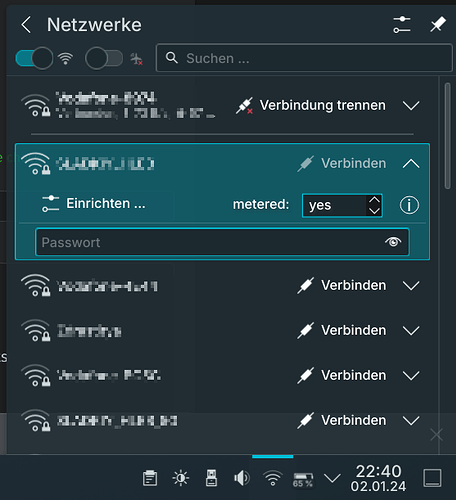The difficult situation with metered networks on the Desktop is, that nearly nobody has a SIM card in there. So a “metered network” is not as easy as on Android, where its simply the cell data.
So to even have a reliable foundation for apps to use this value, it can’t be hidden inside systemsettings. My idea is that, as you can’t rely on a different antenna or SSID (as your phone hotspot “wifi” may be metered), users need to state for every newly added network if it is metered or not.
Here is a concept I thought of
Default value would be empty and users had to pick one, otherwise an error icon appears. This would enforce that every network has the correct value, and if it is wrong its the users fault ![]()
I can imagine this may be a bit annoying for desktop users, so disabling this setting and switch back to “always unmetered” as before may be good. But at the same time, you don’t log in to many Wifis with a Desktop…
On this foundation then we could build update tools that actually work.
Automatic updates
The current situation is like that: automatic updates are hard to implement (apt-automatic lol) and mostly not there. Some Distros like ublue enable them by default, but this may eat away your cell data and disabling them is not easy, so also not a good idea.
The last discussion about this went a bit mad, as people confused automatic updates with “walled gardens”. Good package managers should not have those conflicts, and on modern immutable systems these don’t occur at all.
But even if, such an error could simply be put into a kdialog, and users could see where the issue are.
Updates in Discover
I dont think this makes sense. Honestly, power users may do stuff like holding back updates due to regressions. But normally I would just want my software to be up-to-date.
I use Fedora Kinoite, so immutable minimal base, “never breaking”, and the Apps are Flatpak, also never having dependency conflicts.
Discover for me is for finding software. Nice Appstream metadata (Screenshots, icons, description) and the rating system, really cool.
But after choosing the software, I like to not open Discover anymore. They should just update on their own.
Is this an unpopular opinion?
Other benefits
Apps can detect metered networks and reduce their data usage. Examples on Android:
- Grayjay / Newpipe reduce Video resolution or turn it off entirely
- Antennapod doesn’t download podcasts until confirmation
- Lemmy, Mastodon etc. can reduce image preloading
- Browsers might send “data saver” flags (which is fingerprintable and nearly nowhere used)
- Updates might be paused (GrapheneOS, F-Droid)
- …
So this is really useful. I think it could be really good in other apps too, do you have any examples where you would wish that?
- Thunderbird going into offline mode when setting it
- Kasts not autodownloading podcasts
- Tokodon may reduce image downloads
- Discover may reduce shown thumbnails, updates etc.
- Automatic systemd update services may pause
what is your opinion about this? In the end it would be opt-out, but set the foundation for real “install and forget” PCs, like a Chromebook that is used by non-Admins only, often turned off, never updated manually.
